Details

Forgiveness and Resentment in the Aftermath of Mass Atrocity
Jewish Voices in Literature and FilmPerspectives on Jewish Texts and Contexts, Band 24 1. Aufl.
|
CHF 98.10 |
|
| Verlag: | De Gruyter |
| Format: | EPUB |
| Veröffentl.: | 04.12.2023 |
| ISBN/EAN: | 9783111317816 |
| Sprache: | englisch |
| Anzahl Seiten: | 226 |
DRM-geschütztes eBook, Sie benötigen z.B. Adobe Digital Editions und eine Adobe ID zum Lesen.
Beschreibungen
<p>The author's starting point is the interweaving of forgiveness and resentment in the works of Jewish writers after the Holocaust, most especially Hannah Arendt and Jean Améry, to make sense of the catastrophe and to point to a way forward for both victims and perpetrators. The insights of these two writers and of several Jewish novelists and poets, including Bruno Schulz, Paul Celan, and Aharon Appelfeld, are used to develop accounts of forgiveness and resentment in other cases of mass atrocity around the world. The author offers a critical rereading of primary sources that aim to separate resentment from nonviolent resistance, and forgiveness from reconciliation. Forgiveness and resentment are not, as they might first appear, mutually exclusive. Together with Arendt, Améry, and Walter Benjamin, it is argued that it is through the interaction between them that victims of mass atrocity become agents of personal and cultural change. Together, forgiveness and resentment interrupt the present, reframe the past, and shape the future. They can reduce the chasm that separates memory and trust by fashioning new connections between identity and alterity, which can open paths to truly ethical coexistence for victims and perpetrators, and their descendants. </p>
<p></p>
<p></p>
<p>The author's starting point is the interweaving of forgiveness and resentment in the works of Jewish writers after the Holocaust, most especially Hannah Arendt and Jean Améry, to make sense of the catastrophe and to point to a way forward for both victims and perpetrators. The insights of these two writers and of several Jewish novelists and poets, including Bruno Schulz, Paul Celan, and Aharon Appelfeld, are used to develop accounts of forgiveness and resentment in other cases of mass atrocity around the world. The author offers a critical rereading of primary sources that aim to separate resentment from nonviolent resistance, and forgiveness from reconciliation. Forgiveness and resentment are not, as they might first appear, mutually exclusive. Together with Arendt, Améry, and Walter Benjamin, it is argued that it is through the interaction between them that victims of mass atrocity become agents of personal and cultural change. Together, forgiveness and resentment interrupt the present, reframe the past, and shape the future. They can reduce the chasm that separates memory and trust by fashioning new connections between identity and alterity, which can open paths to truly ethical coexistence for victims and perpetrators, and their descendants. </p>
<p> <strong>Idit Alphandary</strong>, Tel Aviv University, Tel Aviv, Israel. </p>

















